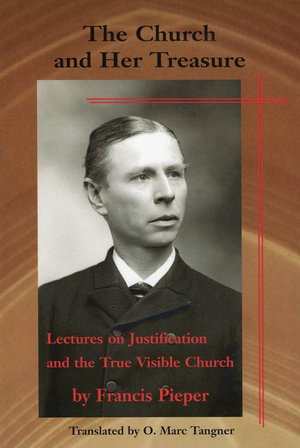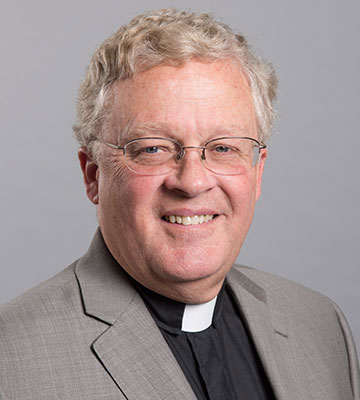[2017-03-04 & 03-08: added text in red below]
This concludes from
Part 3 of the series of blog posts related to the
new 2017 Concordia Publishing House edition of Walther's Pastoral Theology. See
Part 1 for Table of Contents.
- - - - - - - - - - - - - - - - - - - -
-
There is common terminology used by today's LC-MS teachers and leaders when speaking about Walther which is typified by the following statement of Editor David Loy in his
Introduction, p. xv (bolding mine):
"The present work shows the fruits of his labors. In it, he applies Lutheran theology for nineteenth-century Lutheran pastors conducting their ministries in the United States."
One could assume that
Prof. David W. Loy (
of Philosophy) does not mean to limit Walther's theology to only the 19th century, and indeed he includes a section entitled "Why Read Walther's
Pastoral Theology Today?" (
p. xvi). In this section Loy makes the following admirable statement:
...many issues Walther addresses continue to face Lutheran pastors in the twenty-first century, and for many of these issues, Lutheran doctrine establishes fairly specific boundaries for practice that are valid across historical contexts.
Loy's words here are hard to find fault with. Yet even as he defends several areas where Walther's doctrine and practice are still valid, he also explicitly denies other areas due to "historical circumstances". Either in his Introduction or his own footnotes, he denies Walther on
Usury (p. 176 n. 5), and
Life Insurance (p. 348 n 1). Also translator Christian Tiews calls Walther's admonition against
modern Dance "humorous" ("Translator's Notes", p. xx n. 3; p. 122). I have previously blogged on all of these topics and will leave them for the reader to use the hyperlinks to each of these matters to get Walther's (and Pieper's) biblical, evangelical teaching. But there is one matter that Loy raises that I have not blogged on before because it is so obvious from the Bible itself.
A “New Challenge”?
Editor David Loy, in his
Introduction (p. xix) speaks of “new challenges we face” today and includes among these challenges “
homoerotic behavior”. It is implied that “homoerotic behavior” was not a “challenge” in the 19th century. But the Bible speaks quite clearly on the matter of “homoerotic behavior” and is to be handled like all sexual sin. How do I know that the Bible speaks clearly and is not ambiguous? One does not find this specific subject handled in Walther’s
Pastoral Theology. But why? Now what would Walther say today about this subject? Here is one way that he might address this matter with Editor (
philosopher?) David Loy: it can be answered by the widely known homosexual
Episcopal Bishop Gene Robinson (retired) who said (
IndyStar / Journal & Courier, October 28, 2013; text file
here):
 |
| Bishop Gene Robinson (2013) |
“When discussing Bible Scripture that states ‘man shall not lie with man, as with a woman,’ Robinson said the text seems pretty clear.” — Bishop Gene Robinson @ Purdue University October 28, 2013

Yes, I say to you Editor David Loy:
listen to Bishop Gene Robinson for he says “the text seems pretty clear”. And he should know. Would you now try to refute Bishop Robinson and say that the text isn’t clear? But if
the text is clear, then Walther gives
clear Christian counsel for someone troubled with a particular sin, for example on your page 338 (see right, or
here) where he uses Law (“in calm seriousness”), then “the riches of the free, divine grace and mercy in Christ, despite the exorbitance of their sins, according to Romans 5:20”. Sound familiar? Just because the world around us has lost all sense of "natural law" does not mean that God's Word has changed in the slightest. —
 |
Carl S. Meyer
"Walther was:
haughty, proud, inconsiderate, Donatist,
quaint exegete, pietist,
not wholly Christocentic,
biblicist" |
To: Professor David W. Loy
If you should think that I am being overly harsh with you, I must say that I am pleased that you did not say that Walther "could be haughty, proud, and at times even inconsiderate", you did not say that Walther came "close to Donatism", you did not say Walther verged on Pietism, you did not say Walther's exegesis was "quaint",
you did not say Walther was "not wholly Christocentric", you did not say Walther was strongly "biblicistic", as the Director of
Concordia Seminary School for Graduate Studies and great "historian" of the LC-MS
Carl S. Meyer did say in his book
Walther Speaks to the Church, pgs 10-11, 62, 65, 90, in his essay in
CTM 1972 vol 43, p. 262 (also
here), and as reported in
CTM 1973, vol. 44, #3, p. 163 (also
here). — Now Prof. Loy, do not be surprised that your association with the name of “Walther” wins you no true spiritual friends among teachers and leaders of the LC-MS (but maybe enemies?), notwithstanding
a few endorsements (and cheerleading). Certainly the 1960-69 director of Concordia Seminary Graduate Studies would look askance at you for not joining with his judgments. (You might ask
Dr. Robert Kolb if his judgments match those of Meyer's. (
See also Berthold von Schenk.)
- - - - - - - - - - - - - - - - - - - - - - -
To President Matthew Harrison:
I was glad to see that CTS-FW President
Prof. Lawrence Rast added his name to the
endorsements! But where is the endorsement by the other seminary president
Prof. Dale Meyer?... the well-known
Dr. Robert Kolb?... chairman of the
practical theology department
Prof. David J. Peter?...
Prof. Jeffrey Kloha (you and he both endorse Sasse)?...
Prof. Cameron MacKenzie?... and what about the Robert D. Preus Associate Professor of Systematic Theology,
Prof. Roland Ziegler, who helped you translate your
At Home in the House of My Fathers? Ziegler wrote
a complementary essay on Walther's theology for the 2011 anniversary in the
CTQ... would not his endorsement be helpful? — Now, President Harrison, show how important Walther's Works really are to you and your LC-MS – have Walther's
Licht des Lebens sermon book translated and published. Better yet, have Walther's
Epistel Postille sermon books published for they have
already been translated! And here is a key item that cries out for the light of day for our “here and now” times – Walther's
Foreword to the 1886 Lehre und Wehre on the
Inspiration of Scripture. Just ask
Dr. Thomas Manteufel how important this doctrine was for Walther.
- - - - - - - - - - - - - - - - - - - - - - -
I want to end this limited commentary with a most interesting book announcement given for the
original German edition of Walther's book that I ran across many years ago as I was ravaging through all things related to “old Missouri”. It is surprisingly from the old
Ohio Synod (forerunner of today's ELCA), Columbus Ohio. (The
first edition of Walther's book was apparently in 1872, 2nd edition in 1875. PDF copy of announcement
here).
Bolding is mine:
“American Lutheran Pastoral Theology.”
(from the Lutheran Standard of the Ohio Synod, early 1873)
A book with this title has been issued from the press of the Missouri Synod at St. Louis. It is written by Rev. Prof. C. F. W. Walther, which is a sufficient voucher for its ability and thoroughness. But we would perform a service especially to our ministerial brethren by calling particular attention to the work. No Lutheran minister, who is at all able to read the German, should deprive himself of the aid which its rich materials will furnish him in understanding the duties of his high calling and in directing him in the way of their proper performance.
The word American in the title may suggest to some minds the un-Lutheran doctrine and practice in vogue among so-called Lutherans of the General Synod, who are especially fond of calling themselves American Lutherans. It is used in no such sectarian sense in this book, which is a Lutheran Pastoral Theology. The author says in his preface: “That the predicate American Lutheran is used will require no apology, as the choice of the pastoral theological materials was determined by the wants of the American Lutheran pastor.” It is this feature that gives it peculiar value for our ministers, cause for profound gratitude to God that such a Pastoral Theology should he given to the American Lutheran Church.
It would extend our notice to too great a length were we to give even a brief outline of the subjects treated in this admirable look. In its fifth paragraphs and numerous notes everything that properly comes within the compass of Pastoral Theology, and much that some writers would refer to a different branch of theological science, is amply discussed and set forth in that exhaustive manner which is characteristic of the old Lutheran theologians. It would seem that all the wealth of pastoral theology, laid up in many old volumes, to most of which but few of our ministers have access, is collected here into one great treasury. And this whoever will may obtain at the small cost of $2.25.
An alphabetical index of subjects is appended, which greatly enhances the value of the work as a book of reference, for which purpose it will frequently be called into requisition.
The volume contains 445 octavo pages, and is printed on good paper and in clear type. It is for sale by the agent of the Missouri Synod, Mr. M. C. Barthel, corner of 7th and Lafayette Streets, St. Louis, Mo. It is a book which it is profitable even for those ministers to buy who must practice close economy to spare the amount which it costs.
There is but one wish in regard to it that we would yet express. The book is German, and English ministers, though the number is not very large as yet who would be likely to use it, need it so much. Would that the blessing to the American Lutheran Church could be multiplied by its publication in the English language.
What a glorious tribute to
C.F.W. Walther's work by the old Ohio Synod! ... and with a heart-felt request attached. (Apparently the old Ohio Synod would not agree with Carl S. Meyer's judgment of Walther.) Indeed, Concordia Publishing House, Matthew Harrison, Christian Tiews, David Loy, and Benjamin Mayes, you may all take a bow now, for the great request of the Ohio Synod of 1873 has finally been
fully completed! You also did well in not only getting this
fully translated, but also in retaining the
full official name for this book:
American-Lutheran Pastoral Theology.
And that is what it is, the
gold standard in “pastoral theology” (like the “
golden Concordia”
Triglotta), for our modern times,
for the whole world of Christianity, as it is distinguished from the demise of Germany’s “scientific”, rationalistic, ego-based theology. I am sure that
Dr. John Drickamer would be glad for this book and would complement it by name were he still with us here on earth today.
















